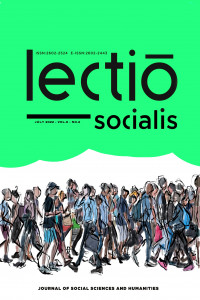Abstract
References
- Aslanidis, P. (2016). Is populism an ideology? A refutation and a new perspective. Political Studies, 64(1), 88-104.
- Hernández, E., & Kriesi, H. (2016). The electoral consequences of the financial and economic crisis in Europe. European Journal of Political Research, 55(2), 203–224.
- Moffitt, B., & Tormey, S. (2014). Rethinking populism: Politics, mediatisation and political style. Political Studies, 62(2), 381-397.
- Mudde, C. (2007). Populist Radical Right Parties in Europe (1st ed.). Cambridge, UK: Cambridge University Press.
- Mudde, C., & Kaltwasser, C. R. (2013). Populism. In M. Freeden, and M. Stears (Eds.). The Oxford Handbook of Political Ideologies (pp. 578-600). Oxford, UK: Oxford University Press.
- Norris, P., & Inglehart, R. F. (2016). Trump, Brexit, and the rise of populism: Economic have- nots and cultural backlash. Harvard Kennedy School, Faculty Research Working Paper Series RWP16-026, August 2016.
- Norris, P., & Inglehart, R. F. (2019). Cultural Backlash: Trump, Brexit, and Authoritarian Populism (1st ed.). Cambridge, UK: Cambridge University Press.
- Stanley, B. (2008). The Thin Ideology of Populism. Journal of Political Ideologies, 13(1), 95-110.
Abstract
Populism has been one of the concepts that attract conflicting opinions from scholars. These debates revolve around many different aspects such as who votes for populist parties, what constitutes a populist leader, which institutional factors help populist parties come to power, and even on how populism should be defined. This conflicting opinion then matters for social scientists since differing opinions about the question of what populism is would then lead to different research and different results. This article analyzes the two different populism definitions: Populism as an ideology, and populism as a discursive style and shows how two definitions yield different results in explaining the economic nexus that drives populist parties. This article shows two seminal works on populism literature; Cas Mudde, and Norris and Inglehart have differing opinions on the economic reasoning behind populist parties solely because of the definitions they attribute to populism.
References
- Aslanidis, P. (2016). Is populism an ideology? A refutation and a new perspective. Political Studies, 64(1), 88-104.
- Hernández, E., & Kriesi, H. (2016). The electoral consequences of the financial and economic crisis in Europe. European Journal of Political Research, 55(2), 203–224.
- Moffitt, B., & Tormey, S. (2014). Rethinking populism: Politics, mediatisation and political style. Political Studies, 62(2), 381-397.
- Mudde, C. (2007). Populist Radical Right Parties in Europe (1st ed.). Cambridge, UK: Cambridge University Press.
- Mudde, C., & Kaltwasser, C. R. (2013). Populism. In M. Freeden, and M. Stears (Eds.). The Oxford Handbook of Political Ideologies (pp. 578-600). Oxford, UK: Oxford University Press.
- Norris, P., & Inglehart, R. F. (2016). Trump, Brexit, and the rise of populism: Economic have- nots and cultural backlash. Harvard Kennedy School, Faculty Research Working Paper Series RWP16-026, August 2016.
- Norris, P., & Inglehart, R. F. (2019). Cultural Backlash: Trump, Brexit, and Authoritarian Populism (1st ed.). Cambridge, UK: Cambridge University Press.
- Stanley, B. (2008). The Thin Ideology of Populism. Journal of Political Ideologies, 13(1), 95-110.
Details
| Primary Language | English |
|---|---|
| Subjects | Political Science, Sociology |
| Journal Section | Review Articles |
| Authors | |
| Early Pub Date | July 21, 2022 |
| Publication Date | July 22, 2022 |
| Submission Date | June 14, 2022 |
| Acceptance Date | July 20, 2022 |
| Published in Issue | Year 2022 Volume: 6 Issue: 2 |
Lectio Socialis is a prestigious, international, and peer-reviewed journal that aims to provide a platform for scholars and researchers to share their work and ideas on policy-relevant topics related to social sciences. The journal welcomes high-quality articles from a wide range of disciplines, including economics, political science, public administration, business administration, international relations, urban planning, sociology, psychology, history, jurisprudence, and philosophy. The primary objective of Lectio Socialis is to maintain a vibrant, independent, and unbiased environment for scholars and researchers from different parts of the world to present their research, exchange ideas, and contribute to the advancement of knowledge in their respective fields.


